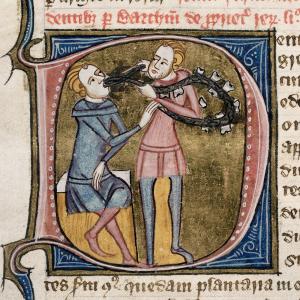 The Psalmist, pleading to God, once indicated how God’s justice could be seen in the way the wicked find their teeth destroyed: “Arise, O LORD! Deliver me, O my God! For thou dost smite all my enemies on the cheek, thou dost break the teeth of the wicked” (P. 37:7 RSV). Justice demanded it, because, metaphorically, the wicked devour the poor of the earth: “There are those whose teeth are swords, whose teeth are knives, to devour the poor from off the earth, the needy from among men” (Prov. 30:14 RSV). God, therefore, is said to break the teeth of the wicked, that is, the instruments of malice which are used to tear at, mash and grind the weak and needy poor. “For the needy shall not always be forgotten, and the hope of the poor shall not perish for ever” (Ps. 9:18 RSV).
The Psalmist, pleading to God, once indicated how God’s justice could be seen in the way the wicked find their teeth destroyed: “Arise, O LORD! Deliver me, O my God! For thou dost smite all my enemies on the cheek, thou dost break the teeth of the wicked” (P. 37:7 RSV). Justice demanded it, because, metaphorically, the wicked devour the poor of the earth: “There are those whose teeth are swords, whose teeth are knives, to devour the poor from off the earth, the needy from among men” (Prov. 30:14 RSV). God, therefore, is said to break the teeth of the wicked, that is, the instruments of malice which are used to tear at, mash and grind the weak and needy poor. “For the needy shall not always be forgotten, and the hope of the poor shall not perish for ever” (Ps. 9:18 RSV).
Origen, in giving his understanding of Scripture, indicated that we should be careful and not take it literally. Spiritual realities are being presented through the means of physical bodies and history:
But let us give ear to all these things, referring what is said, not to physical bodies and men, but to certain spiritual realities and principles that are more or less numerous in which those descending into, or entering into, and perhaps also somehow even ascending into birth participate in different ways.[1]
For this reason, it is invaluable for us to consider what we could learn about spirituality when we ponder teeth. One way to do this is to consider dental hygiene and its similarity to the spiritual life. As tartar and plaque can build up on teeth before destroying the tooth with decay, so sin can encase itself around our soul, sticking upon us, building upon, until it leads to some sort of spiritual malaise. Brushing our teeth several times a day can help keep them healthy, just as dealing with our venial sins through prayer, charity, fasting, communion, and other forms of spiritual engagement can help keep our soul from slipping into greater spiritual danger. Nonetheless, just as the plaque can build up and slowly build up no matter how careful we are in our hygiene, so we go to the dentist for routine cleanings, likewise we can go to confession, to pick away at the buildup of sin in our life. As dentists will drill away at decay and strengthen our teeth with fillings, so is the priest the instrument of God’s grace, where the sin is not only cleansed, but filled with grace so that we can become spiritually whole.
Likewise, as our teeth often become stained by what we eat, drink, or smoke, giving a glimpse of our indulgences to others, so our souls can be tarnished by our passionate indulgences; even if we clean our teeth, removing all the plaque and tartar, and go to the dentist, our teeth can still end up appearing yellowish instead of white. When this happens, there are means by which the teeth can be whitened, but to do that will require special treatments which will slowly eliminate all the soiling which tarnish then. Similarly, then, we can find that our will becomes soiled as a result of our sins, where we form habits of sin which we must work with extra effort to overcome. It will be a slow process, similar to the way our teeth will need several whitening treatments in order to become white. If we want our teeth to remain white, we will then have to be careful and not eat or drink foods which will likely tarnish them again; likewise, if we want our will to be made truly free and pure, we will have to overcome our temptations and break the habit, never returning to those actions which are likely to entrap us and turn us back into a habit of sin.
Thus, our teeth, as with many other aspects of our body, can manifest something of our character. This realization is expressed in Scripture in the way bad teeth are seem to crumble in the mouths of the wicked. As our sins cause harm to others, so we are seen to be wicked preying on the weak. We too deserve the condemnation of the wicked, to have our teeth break, insofar as we share in and join in with the destruction of the common good. But, we must understand, all of this is allegorical.
We must daily strive for justice, to hunger for justice, and wipe away any inclinations towards injustice. If we prey on the weak, we will receive our recompense in the way those who thrive on food without consideration of what that food does to their teeth will find their teeth decaying and breaking up. Those who are wicked, those who are untrustworthy, whose word and honor are not to be trusted are like bad teeth which will give away without notice: “Trust in a faithless man in time of trouble is like a bad tooth or a foot that slips” (Prov. 25:19 RSV).
So long as we join in with the wicked and ignore the plight of the oppressed, that is, so long as we let the impious rule without restraint, without objection, we too, find ourselves to be untrustworthy. As we give in to the inordinate desires of a deluded crowd, our virtue, our goodness, will be broken up and destroyed as we show ourselves unfaithful to those who need our help. We must stand up for what is right. We must help the afflicted. We must not cowardly excuse ourselves, saying it is not for us to demand justice in an unjust world. Let us not find ourselves giving in to sin, to supporting injustice, lest, like bad teeth taken over by decay, we will no longer be able to be patched up and healed but pulled out and cast away into the trash. For, as Scripture warns us, we risk eternal perdition if we give in to such pusillanimity: “But as for the cowardly, the faithless, the polluted, as for murderers, fornicators, sorcerers, idolaters, and all liars, their lot shall be in the lake that burns with fire and sulphur, which is the second death” (Rev. 21:8 RSV).
[IMG=Miniature on a initial ‘D’ with a scene representing teeth (“dentes”) from Omne Bonum. [Public Domain] via WikimediaCommons]
[1] Origen, Commentary on the Gospel of John Books 13-32. Trans. Ronald Heine (Washington, DC: CUA Press, 1993), 210.













